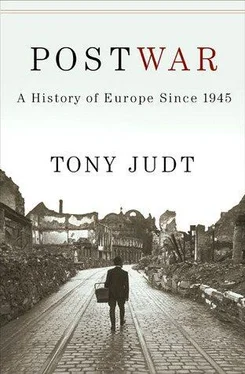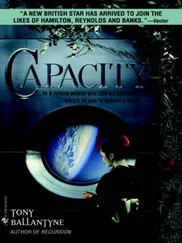The Holocaust was only one of many things that people wanted to forget: ‘In the fat years after the war… Europeans took shelter behind a collective amnesia’ (Hans-Magnus Enzensberger). Between their compromises with Fascist administrators and occupying forces, their collaboration with wartime agencies and rulers and their private humiliations, material hardships and personal tragedies, millions of Europeans had good reasons of their own to turn away from the recent past, or else mis-remember it to better effect. What the French historian Henry Rousso would later dub the ‘Vichy syndrome’—the decades-long difficulty of acknowledging what had really happened during the war and the overwhelming desire to block the memory or else recast it in a usable way that would not corrode the fragile bonds of post-war society—was by no means unique to France.
Every occupied country in Europe developed its own ‘Vichy syndrome’. The wartime privations of Italians, for example, both at home and in prison camps, diverted public attention from the suffering Italians had caused to others—in the Balkans, for example, or in Italy’s African colonies. The stories that the Dutch or the Poles told themselves about the war would sustain the national self-image for decades—the Dutch in particular setting great store by their image as a nation that had resisted, while forgetting as best they could that 23,000 Dutchmen volunteered for the Waffen SS: the largest contingent from Western Europe. Even Norway had somehow to digest the memory that more than one in five of its military officers had voluntarily joined Vidkun Quisling’s neo-Nazi Nasjonal Samling (‘National Rally’) before or after April 1940. But whereas liberation, resistance and deportees—even heroic defeats like Dunkirk or the Warsaw Rising of 1944—could all be put to some service in compensatory national myth-making, there was nothing ‘usable’ about the Holocaust. [420]
In certain respects it was actually easier for Germans to engage and acknowledge the scale of their crime. Not, of course, at first: we have seen how ‘de-Nazification’ failed. History teaching in the early Federal Republic stopped with the Wilhelminian Empire. With the rare exception of a statesman like Kurt Schumacher—who warned his fellow countrymen as early as June 1947 that they had better learn to ‘talk for once about the Jews in Germany and the world’—German public figures in the Forties and Fifties managed to avoid any reference to the Final Solution. The American writer Alfred Kazin remarked upon the fact that for his students in Cologne in 1952 ‘the war was over. The war was not to be mentioned. Not a word was said by my students about the war’. When West Germans looked back it was to memories of their own sufferings: in polls taken at the end of the Fifties an overwhelming majority identified the Allied post-war occupation as ‘the worst time of their lives’.
As some observers had already predicted in 1946, the Germans successfully distanced themselves from Hitler: evading both punishment and moral responsibility by offering the Führer to the world as a scapegoat. Indeed there was considerable resentment at what Hitler had wrought—but at the harm he had brought down upon the heads of Germans rather than because of what he and Germans had done to others. Targetting the Jews, as it seemed to many Germans in these years, was not so much Hitler’s greatest crime as his greatest error : in a 1952 survey, nearly two out of five adults in West Germany did not hesitate to inform pollsters that they thought it was ‘better’ for Germany to have no Jews on its territory.
Attitudes like these were facilitated by the relative absence of nearby reminders of Nazi atrocities; the Nazis had carefully located their main death camps far from the ‘Old Reich’. Not that proximity in itself was any guarantee of sensibility. The fact that Dachau was a suburb of Munich, a tram-ride from the city centre, did not in itself advance local understanding of what had taken place there: in January 1948 the Bavarian parliament unanimously voted to convert the site of the Nazi camp there into an Arbeitslager , a forced labour camp for ‘work-shy, a-social elements’. As Hannah Arendt observed on visiting Germany in 1950: ‘Everywhere one notices that there is no reaction to what has happened, but it is hard to say whether this is due to an intentional refusal to mourn or whether it is the expression of a genuine emotional incapacity’. In 1955 a Frankfurt court acquitted one Dr Peters, the general manager of a company that provided the SS with Zyklon-B gas, on the grounds that there was ‘insufficient proof’ that it had been used to kill deportees.
At the same time, however, Germans—uniquely in Europe—could not deny what they had done to the Jews. They might avoid mention of it; they might insist upon their own sufferings; they might pass the blame up to a ‘handful’ of Nazis. But they could not sidestep responsibility for the subject by attributing the crime of genocide to someone else. Even Adenauer, though he confined himself in public to expressions of sympathy for Jewish ‘victims’ without ever naming those who victimized them, had been constrained to sign the reparations treaty with Israel. And whereas neither the British, nor the French, nor even his fellow Italians showed any interest in the memoirs of Primo Levi, The Diary of Anna Frank (admittedly a more accessible document) was to become the best-selling paperback in German history, with over 700,000 copies sold by 1960.
The trigger for German self-interrogation, as we have seen, was a series of trials prompted by belated investigations into German crimes on the eastern front. Beginning in Ulm in 1958 with proceedings against members of wartime ‘Intervention Groups’, followed by the arrest and prosecution of Adolf Eichmann, and culminating in the Frankfurt trials of Auschwitz guards between December 1963 and August 1965, these proceedings were also the first opportunity since the end of the war for camp survivors to speak publicly about their experiences. At the same time the Federal Republic’s twenty-year Statute of Limitations for murder was extended (though not yet abolished).
This change in mood was driven in large measure by a wave of anti-Semitic vandalism at the end of the Fifties and by growing evidence that young Germans were utterly ignorant about the Third Reich: their parents had told them nothing and their teachers avoided the subject. Beginning in 1962, ten West German Länder announced that henceforth the history of the years 1933-1945—including the extermination of the Jews—would be a required subject in all schools. Konrad Adenauer’s initial post-war assumption was thus reversed: the health of German democracy now required that Nazism be remembered rather than forgotten. And attention was increasingly directed to genocide and ‘crimes against humanity’, rather than the ‘war crimes’ with which National Socialism had hitherto been primarily associated. A new generation was to be made aware of the nature—and the scale—of Nazi atrocities. No longer would popular magazines like Stern and Quick be able to downplay the significance of the camps, as they had done in the Fifties, or sing the praises of ‘good’ Nazis. A certain public awareness of the unacceptability, the indecency of the recent German past began to take hold.
The change should not be exaggerated. During the Sixties both a West German Chancellor (Kiesinger) and the Federal President (Hans Lübke) were former Nazis—a glaring contradiction in the Bonn Republic’s self-image that younger commentators duly noted, as we saw in Chapter 12. And it was one thing to tell the truth about the Nazis, quite another to acknowledge the collective responsibility of the German people, a subject on which most of the political class was still silent. Moreover, while the number of West Germans who believed that Hitler would have been one of Germany’s greatest statesmen ‘but for the war’ fell from 48 percent in 1955 to 32 percent in 1967, the latter figure (albeit composed overwhelmingly of older respondents) was hardly reassuring.
Читать дальше












